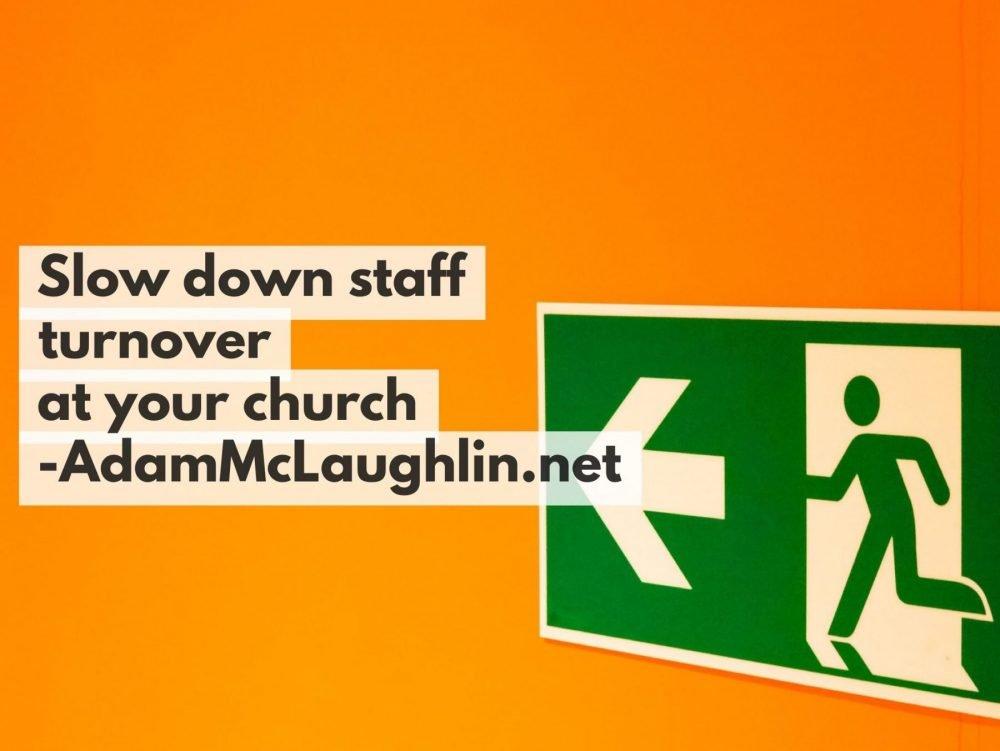I’ve been hearing a theme lately at conferences, podcasts, blogs, facebook groups, published books, (and in private messages and emails to me. Side note: adam@adammclaughlin.net if you want to chat) and it’s been on my mind, almost to the point of concern.
It’s not a point of concern because I disagree or I think it’s misleading, but the concern is that it’s true, and relevant to enough people to come up in so many unrelated contexts.
The theme:
Maybe it’s time to consider moving on from your church job.
This theme comes up in different ways like:
- Working at a church can be a terrible job.
- Let me guess: Your “other duties as assigned” are taking more time than your actual job description.
- If you leadership (read: Pastor, Manager, Supervisor, Board of Directors) doesn’t trust you to do your work, then find somewhere that allows you to do what you know to do.
- We know that often church wages are sub-par compared to wages outside the church. If that’s causing stress, there are other places you can do similar work, clock out at the end of the day, and make more money.
To be clear, none of the speakers or writers were making a suggestion, and all suggested ways to work out the details, but they all had the message that it’s ok to move on if you need to.
I wish I had a magic wand to solve all of these statements, and if you haven’t noticed yet, I don’t.
I don’t even have answers to most of them, and definitely not blanket statements that you as a leader can apply at your church, because your culture and context is unique from every other church, however what I do know is:
Leaders: The problem is your culture.
Like it or not, your culture, informed by your values, drives every decision, delegation, and experience that your church is known for, whether internally with your staff or volunteers, or externally in your community.
I won’t pretend to even make suggestions about necessary steps, but, for a moment, here are a few things to consider when adjusting or evaluating your culture so your church is a great place to work.
Why Having Clearly Articulated Values Matters:
Your culture is informed by your values. Being unclear about your values (meaning discussing, writing them down, and having them come up in every discussion where a decision is made) doesn’t mean a culture doesn’t exist. It means that your culture is a wide net, with ever-changing results where it can feel like anything goes, and then nothing goes.
Whether you realize it or not, every decision made is based on values: What you wear, how you do your hair, whether you brushed your teeth, what you ate for breakfast, what time you woke up, which brand of toothpaste you use, whether you made coffee at home or picked one up on the way to the office – all of these decisions were made this morning based on your values, even before you left your house.
When you don’t have values articulated for your church, then each person is making decisions based on their personal values, which, understandably, are going to vary from one person to another.
This is why we get church splits over how to spend money.

Neither are wrong, and both could be the best answer depending on the organization and the situation, but the head-to-head values where one person can’t understand the other’s side creates an impasse.
When you make a decision for your organization or your staff, you’re making them based on your personal values, and each staff member is making their decision based on their values, and mixed together, that’s where ideas and opinions collide – actually, it’s where culture can’t come to terms with itself and either collides or separates.
Making group decisions based on only personal values is like trying to mix oil and water. Nobody is going to win.
Having clear organizational values fixes this:
When a church (or business, or organization) has clearly articulated your values, then an interesting phenomenon happens: People will allow the organization’s values to override their values when making decisions on behalf of the organization.
The conversation when making a decision moves from “I think we should….” to “Since we value X, then we could…..”
- Since we value reaching our community first, then we could spend that money getting the old carpet replaced.
- Since we value family, we could have a conference focussed around parenting, rather than a business conference.
- Since we value multiplication, we could build a new campus rather than expand our current building.
Unless you’ve clearly articulated your values, there’s no way these conversations can happen.
What does that have to do with church staff?
I get it. Having 3-5 values doesn’t mean that you’ll be able to pay your staff more, or that they’ll produce perfect work the first time and won’t get their feelings hurt if there needs to be a revision.
Values allow a framework for discussions, and can inform:
- How staff can have a respectful conversation with a different opinion from the leadership so they feel like they’re being heard. “Would you help me understand your decision based on our values?”
- How and when you evaluate compensation.
- Discussions for interviewing and on-boarding new staff so they’re clear on your culture
- People who thought your valued something, but realize you actually value something different can move on to create a more cohesive team.
- How staff help those they manage to understand the decisions they’re making. “Since we value X, the decision is to…. – Do you have any ideas on other ways we can help people experience that value in this situation?”
Need help discovering your church’s values?
If you’re a DIY, consider picking up a copy of Patrick Lencioni’s book: The Advantage. which talks about 6 questions that every organization needs to answer.
If you’re looking for a more hands-on approach, I help churches use this framework to create a Community Impact Strategy where we’ll not only walk through how to discover your core values, but also how to make them practical in a 6-month marketing strategy to impact your community. Ready to learn more? Send me an email: adam@adammclaughlin.net
What are your church’s core values? Leave a comment so we can learn together.
